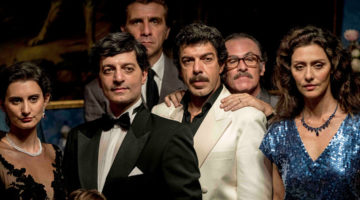Review: Stop the Pounding Heart
Somewhere between a documentary and a staid drama where people play themselves stands Italian-American director Roberto Minervini’s gorgeously realized and slowly paced Stop the Pounding Heart. It’s not 100% documentary truth, but it comes with a commitment to raw austerity and an eye for subtle human drama that makes it unique. It probably won’t be for anyone with mainstream tastes, but the final film in the director’s “Texas trilogy” – following The Passage and Low Tide – has a visceral power that will stun art house audiences who prefer the visual poetry and subtle emotion of Terrence Malick and Nicolas Pereda to standard documentaries.
Sara Carlson (who appears in The Passage) is a teenager growing up in Waller, Texas on a goat farm with her parents and eleven other siblings. The family believes in the power of the unit and the lord, homeschooling their children to keep bad influences out and espousing the importance of the purity rings they’re given when they turn 14. Colby Trichell (who appears in Low Tide) is a good ol’ boy teenager living in a trailer park near where the Carlson family sells their milk and cheese. He practices his bull riding, shoots guns with his family, drinks with buds, and speaks like a laid back Texan surfer. Their lives overlap only in passing, but Sara’s noticeable feelings of tenderness towards Colby will force her to think about what it means to be a good Christian.
Minervini does a better job of blurring the lines between reality and drama here than Robert Greene did in his similarly lauded Actress from last year, mostly because there doesn’t seem to be much for the filmmaker to manipulate or skew towards his dramatic goals or personal opinions about his subjects. Described as a “deeply personal” look at “the new poor” by the filmmaker, it’s a picture of a family in spiritual, emotional, and financial flux. There are subtle moments where it’s made known that times are tough for the Carlsons, but they’re so resilient that cracks in the facade rarely show. With the exceptions of Sara giving her obviously stressed mother a shoulder rub while at the market and a moment where her father rather cruelly berates her out of nowhere for not knowing how to properly install a fence, this appears to be a strong family unit that’s aware of the presence of the camera. The handheld cinematography combined with Minervini’s sense of his locations leads to a film where you can almost smell the summer rains hitting the paddocks.
If the authenticity of these events has been manipulated, it has been done with a remarkable amount of respect and control. Only a brief sequence when Sara and Colby come across a burning cross at night raises a few eyebrows about its inclusion and relevance. For the most part the filmmaker follows his subjects at a safe distance; preferring to be one of the flock rather than the one steering it. Minervini doesn’t seek to tear down the myth of religion, but he’s respectfully skeptical towards the spiritual leanings of the Carlsons. This manifests itself through Minervini’s depiction of Sara’s blossoming into a potentially progressive woman. When Sara’s mother explains to her the biblical belief that women are to remain subservient to men (and that it’s somehow a stronger thing to do than being your own person) or she’s chastised by her siblings for saying that she never wants to get married, the young woman rolls her eyes and tries her best to keep her un-Christian thoughts to herself.
It builds to a final moment of catharsis for Sara that delivers the final point of the film. It sucks growing up regardless of who you grow up around. All human beings are works in progress, but nothing can match the internal terror of being a teenager. It’s a nice final note in a remarkably humanist work.
[star v=4]



